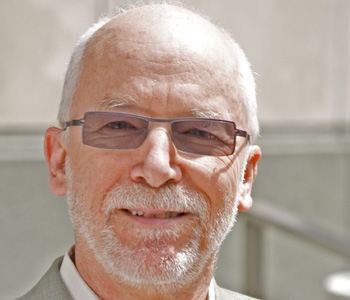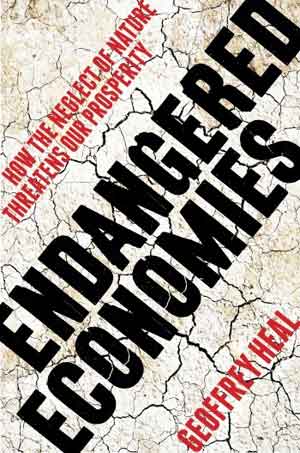
Environmental conservation is essential to a prosperous, healthy lifestyle. It is a necessity and not a luxury. We are part of the environment: we evolved with nature and depend on nature. Conserving the environment means conserving ourselves.
Yet our current economic model poses a threat; the threat is catastrophic environmental change within decades. This conflict between economy and environment is not inevitable, but arises from failures in our economic system. We can readily fix the most egregious flaws in the system to allow the economy and the environment to coexist and nurture one other.
External costs pose the biggest of these market failures that threaten the environment. They occur when a third party must pick up the tab for the negative consequences of a transaction. Let’s say, I buy gasoline and burn it in my car. Thereby, I harm people, who inhale the exhaust fumes, and people, whose climate is altered by the greenhouse gases that the car I drive generates. The people who are injured did not purchase and burn the gas – I did. Yet, I do not pay for the harm done to them, so there is little to make me aware of it, and I have no incentive to stop.
A second problem is that property rights are not always clearly defined, and here, too, the consequences are dire. Valuable capital is destroyed or harmed. No one owns the fish in the sea; they become property only in the marketplace. This leads to overexploitation because no one has an incentive to conserve resources that they don’t own. As a result, many fish stocks have plummeted by 90% in the last 50 years. It’s not just that the number of fish has fallen. Small fish tend to mature faster and have a better chance to breed before being caught; they also have a better chance of escaping capture. Thus, the process of natural selection has resulted in a diminished population of ever-smaller fish.
A third problem is that the natural world provides services that are essential to our prosperity, but that are not valued in our economic calculations. Natural assets provide a stream of services over time, just as physical or intellectual capital goods provide a flow of benefits, which makes the natural world a form of capital. Some of our most important and valuable assets are in fact natural capital, yet we generally don’t include them in our accounts or on our balance sheets. Our accounts don’t reflect their loss. Take the case of fish stocks: we are depleting this asset, yet we don’t mark this in any of our accounting at the national or personal levels.
The final economic flaw driving conflicts between the economy and the environment concerns how we evaluate our economic performance: we worship false gods. We use Gross Domestic Product (GDP) as the performance standard, but it’s wrong. GDP can go up when bad things happen, such as a hurricane or flood that necessitates rebuilding and generates income for contractors and their employees and suppliers. GDP can fall because of good outcomes, such as the introduction of long-lasting light bulbs. Fewer of these are sold, leading to a drop in the income of producers – but overall we are better off because we are using resources and energy more efficiently. We shouldn’t be rating ourselves by GDP growth, but by sustainable increases in human wellbeing.
I’ve identified four reasons why our economic system doesn’t support the natural world. All four of these problems can be fixed by straightforward institutional or policy reforms.
In fact, there are many ways of solving the problem of external costs. We can levy a charge on a harmful activity to reflect the costs it imposes on bystanders: this is sometimes referred to as “green taxation.” Alternatively we can give damaged parties the right to sue the originator of the damages, as happened with the BP Deepwater Horizon oil spill in the Gulf of Mexico. Another solution would be to regulate activities that affect innocent third parties. We do this with vehicle emissions in the US and in Europe. Consumer and investor activism can play a role here too: if consumers boycott companies responsible for environmental damage, the corporate world has an incentive to take external effects into account. The same is true of capital markets – if investors stay away from environmentally harmful companies, there is again an incentive to take environmental issues into account. These are possible responses to harmful environmental impacts. We can’t afford to continue to ignore this failure in our economic institutions.
We can also solve the problem of weak property rights that provide no incentive to conserve. In fact, in the case of fisheries, we are beginning to fix this problem through systems of tradable quotas that were recently introduced in many fisheries and are proving effective. These quotas give fishermen a stake in their fishing ground and an incentive to think about its future. They work: fisheries where they have been introduced are now much healthier than before, whereas the others continue to deteriorate. There are other alternatives, some of which are being successfully applied to manage the depletion of ground water reserves, another important area where property rights are not well defined.
Our accounting systems fail us by not recognizing the value of natural capital. Accountants should warn you when you are running down your capital, but ours don’t. We don’t have any accounting indicator that warns us that fisheries or other natural resources are being depleted. Valuable natural assets are being run down without warning. We have to change this and now is the time. In fact, the United Nations, which sets the framework for the accounts of nations, has already proposed a framework for accounting for our natural assets, which several countries (Australia, Canada, Norway) are already implementing. The US has declined to follow suit.
I noted the shortcomings of our normal performance measure, GDP. Better measures of economic performance are under development. These measures reflect the sustainability of our activities and our impacts on natural capital. We need to implement them and evaluate our performance by the results to have a reality check on institutions that govern our lives.
The natural world contributes in crucial ways to our physical wellbeing. There are also spiritual and esthetic dimensions to what it brings, and it is these that have traditionally motivated people to argue for conservation. Nature’s economic contributions are not taken into account. I look at how these can be measured and what the results are.
To give a sense of where this takes us, the world’s populations of pollinating insects represent an asset that is worth at least $14 trillion. Without them, up to a third of our food crops would be lost. And the world’s forests are worth well over $10 trillion just for their contribution to stabilizing the climate by photosynthesis, taking carbon dioxide out of the air and replacing it with oxygen. I calculate these values by estimating the value of the services the assets provide each year, and then capitalizing this over their lifetimes – the standard way of valuing any capital asset.
Biodiversity is another asset that is undoubtedly of great value, but we understand so little of why it matters to us that we can only value a few of the many aspects of its contributions to human societies. I identify several contributions. One is the development of medicines through bioprospecting. Another is the insurance role played by crop varieties that are not currently used commercially and can be used to replace current commercial varieties, if these fall to the assaults of pests. Yet another contribution is that biodiversity has allowed the development of all of our important foods crops and animals from their wild originals. And, of course, the popularity of nature programs shows that we have an intrinsic attraction and attachment to biodiversity.
Conserving the environment is crucial to our prosperity and the continued well-being of our children and grandchildren. There should be no conflict between the environment and the economy because the economy needs the natural world. But our institutions as currently configured give the appearance of conflict for the four reasons I summarized: external costs which do not figure in the calculations of firms and consumers, the abuse of important resources for lack of ownership, the great but unrecognized value of natural capital, and our obsession with the inadequate performance measure GDP.
All of these problems can be fixed. It is easy to bring external costs home to those who generate them, to find ways of managing natural capital that is not owned by anyone, to account properly for the value of the natural world, and to find a better measure of economic performance than GDP. We know how to do all of these things, and most of them are already being done successfully in some societies. We just need to do all of them at scale.
The obstacles to conservation are not economic or technological – they are political. We are not doing what we need to accomplish because powerful vested interests, would be required to pay for their sins, starting with the fossil fuel industry.
The world faces serious environmental problems. Maps are already being redrawn to reflect loss of landmass to rising seas, and nations are beginning to fail because of water shortages. The natural world is critically threatened by mismanaged human activity, imperiling not only human populations but thousands of other species that call the forests and the oceans home. Now is the time to use the tools readily at hand to manage natural resources wisely. We need to use these tools broadly and boldly to rebuild a prosperous and sustainable world and end the threats to our prosperity engendered by our neglect of nature.


Geoffrey Heal is Donald C. Waite Professor of Social Enterprise at Columbia Business School. He is a Member of the National Academy of Sciences; Fellow of the Econometric Society; Past President of the Association of Environmental and Resource Economists, recipient of its prize for publications of enduring quality, and Life Fellow; Director of the Union of Concerned Scientists; founder, Director and Chairman of the Board of the Coalition for Rainforest Nations; member of the economic advisory board of the Environmental Defense Fund; and coordinating lead author of the Intergovernmental Panel on Climate Change’s fifth assessment report.